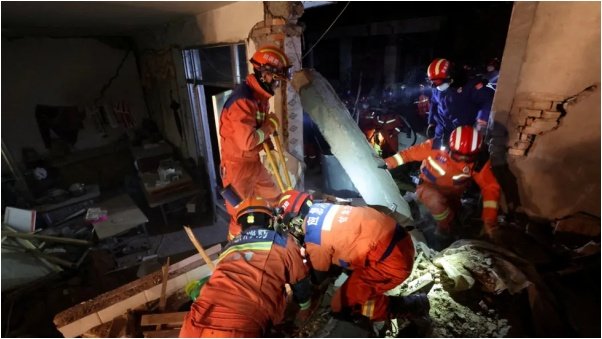At least 118 people have been killed in north-west China in the country's deadliest earthquake in 13 years.
The 6.2 magnitude quake hit mountainous Gansu province around midnight on Monday (16:00 GMT), also shaking neighbouring Qinghai.
Fatalities may rise with hundreds reported injured in icy conditions.
Chinese President Xi Jinping has ordered thousands of rescue crew to the region, among the poorest and most diverse in China.
On Tuesday, footage shown on state TV and social media networks showed entire villages split by the quake, as well as collapsed buildings and houses.
Residents who fled their homes were also shown huddling over makeshift fires at hastily erected evacuation camps. Temperatures hit -13C (8.7F) on Tuesday, Chinese media reported.
Survivors said the tremors had felt like "being tossed by surging waves", and recalled rushing out of their apartments.
"I woke my family up and we rushed down all 16 floors in one breath," said one man named Mr Qin by Chinese outlets.
Local officials in Jishishan county, the worst hit in Gansu province, said more than 5,000 buildings in the area had been damaged.
Chinese media quoted a director of the Gansu rescue team, who attributed the widescale damage to poor building quality in the villages - many homes being old and made of clay.
Gansu lies between the Tibetan and Loess plateaus and borders Mongolia. The remote region is one of China's poorest and most ethnically diverse.
The epicentre of the quake was in Linxia Hui Autonomous Prefecture, home to many Chinese Muslim groups, including the Hui, Bonan, Dongxiang and Salar people.
Chinese authorities said the quake measured 6.2 on the Richter scale, while the US Geological Survey (USGS) recorded a magnitude of 5.9 and depth of 10km (6 miles). About 10 aftershocks have taken place, local authorities reported.
On Tuesday, Xinjiang, the province west of Gansu, also recorded a 5.5 magnitude quake - but there were no immediate reports of casualties.
Across the region, power and water supplies have been disrupted, hindering rescue efforts.
Officials say they have limited time left to rescue people in the sub-zero conditions.
"It is too cold to bear...it's -15C [here]," Wang Yi, chief commander of the Blue Sky Rescue Team told the BBC. Blue Sky is China's largest non-governmental humanitarian organisation, with more than 30,000 volunteers across the country.
Mr Wang said he expects the number of casualties to climb. "We now need to dig deeper [into the rubble]. But there are no big buildings in the area. So it will rise, but it won't be much," he said.
President Xi has said "all efforts should be made to carry out search and rescue, treat the injured in a timely manner, and minimise casualties".
China sits in a region where a number of tectonic plates - notably the Eurasian, Indian and Pacific plates - meet, and is particularly prone to earthquakes.
Last September, more than 60 people were killed when a 6.6-magnitude quake hit south-western Sichuan province.
The Gansu earthquake is the deadliest China has seen since the devastating 2010 quake in Yushu, Qinghai province, which claimed almost 2,700 lives.








